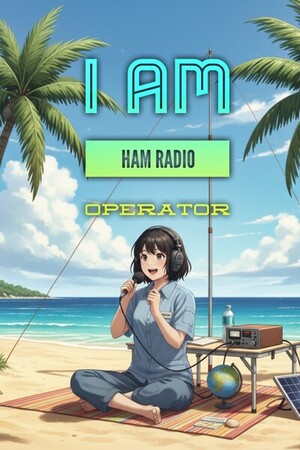Chapter 33:
Chapter 33: A Thousand Points of Light
I am Ham Radio Operator
The numbers become the entire focus. My life, once measured in meaningful conversations and shared experiences, is now quantified by the relentless accumulation of digital contacts. The results of this single-minded obsession are staggering, and they redefine what I thought is possible in the hobby.
My logging software is always running, a silent, meticulous accountant of my on-air life. The number in the "Total QSOs" box at the bottom of the screen becomes my personal scoreboard, a figure I check with the same frequency that other people check their social media feeds. It ticks upward with a hypnotic regularity. One thousand. Two thousand. Five thousand.
The awards, once distant, aspirational goals, start to fall like dominoes. The first to arrive is the big one: the DX Century Club (DXCC) award from the ARRL. This requires confirmed contacts with 100 different amateur radio "entities," which are essentially countries. For most hams, achieving DXCC is the work of years, a capstone achievement. I complete it in under four months. The handsome certificate arrives in the mail, but I feel a strange sense of detachment. There is no feeling of a long, hard-won victory. It just feels like I have successfully completed a task. I file it away and immediately start working on the next level: 200 countries.
Then comes the Worked All States (WAS) award, which is almost laughably easy on FT8. I confirm contacts in all 50 states in a single weekend. The Worked All Continents (WAC) award follows shortly after. My name starts appearing regularly in the monthly awards listings in the ham radio magazines, a constant presence that does not go unnoticed.
The ultimate FT8 achievement is the ARRL's Grid Square award. The world is divided into a grid of squares, each identified by a six-character code like my own OJ51XX. Chasing these grid squares becomes my primary focus. It is the perfect game for a data-driven mind. It is a map to be colored in, a massive, global game of Bingo. I download special software that interfaces with my log, displaying a world map covered in a rainbow of confirmed grid squares. The empty, grey squares become my targets, my personal frontiers.
I become a master of propagation. I know that to work the rare grids in central Africa, I need a specific opening on the 12-meter band just after sunrise. I know that the only way to reach the tiny, desolate islands in the far South Atlantic is via a long-path opening on 20 meters that lasts for only twenty minutes just before my local sunset. My sleep schedule, already erratic, completely shatters. I am now living on "Zulu time," the universal time standard used in radio, my life dictated not by the sun in my own sky, but by the subtle, invisible tides of the ionosphere.
The ten thousand contact milestone arrives on a Tuesday afternoon in late autumn, just under a year after I first downloaded the WSJT-X software. The contact is not a rare, exotic island, but a simple station in France, a country I have worked hundreds of times before. The software pings, the contact is automatically logged, and the number at the bottom of the screen flips over to 10,000.
I just stare at it. Ten thousand points of light. Ten thousand times, my signal has traveled from my small apartment to another station somewhere on the planet. I should feel a profound sense of accomplishment, of triumph. Instead, I feel a hollow, echoing emptiness.
I scroll through my log, a massive, almost endless list of callsigns and grid squares. I do not know any of these people. I do not know their names, their voices, their stories. They are just data points in my grand collection. I have filled my map, but I have emptied my hobby of its meaning. Gregory's words from months ago come back to me, sharp and clear: "It sounds more like you are just collecting stamps." He was right. I have become the world's most efficient stamp collector.
That evening, I force myself away from the waterfall. I plug my Morse code key into the radio, something I have not done in what feels like an eternity. I spin the dial away from the FT8 frequencies and find the CW portion of the band. It feels like visiting an old, half-forgotten neighborhood. The sounds are so different. The slow, musical conversations, the friendly, unhurried rhythm.
I tune around for a while, just listening. I hear two old friends catching up, their fists as familiar to each other as their own handwriting. I hear a new ham, his sending slow and careful, being patiently encouraged by a more experienced operator. This is the world I have left behind. This is the soul.
With a trembling hand, I send out a slow, tentative call. "CQ DE 9W8ABC K."
For a moment, there is only silence. The old anxiety flickers. Maybe I have forgotten how. Maybe I do not belong here anymore.
Then, a reply comes back, from a station in Canada. His sending is smooth and relaxed. After we exchange signal reports and names, he sends a question. "U R A LONG WAY FROM THE DIGITAL BANDS, HARUKA. NICE TO HEAR U ON CW AGAIN."
He knows me. He has noticed my absence. The simple, friendly message is a crack in the hollow shell I have built around myself. I am not just a data point to him. I am Haruka. A real person.
My fingers, stiff and clumsy at first, slowly find their old rhythm. "NICE TO BE BACK," I send. "FORGOT HOW MUCH I MISSED THE MUSIC."
It is the first real conversation I have had on the radio in almost a year. And it feels like coming home. The waterfall is still there, still calling to me with its siren song of easy, quantifiable achievement. But I know now that I cannot live there. A thousand points of light are beautiful, but they cannot replace the warmth of a single, genuine human connection.




Please sign in to leave a comment.